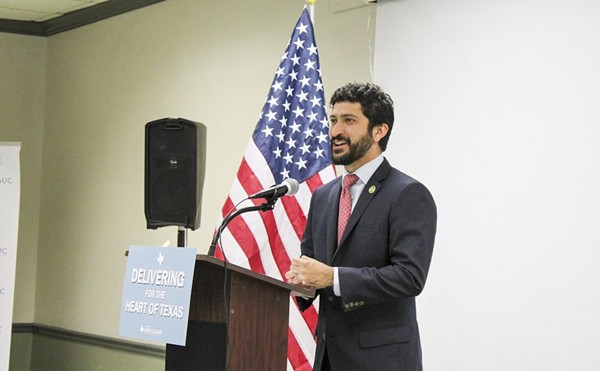“At what point must a female Senator raise her hand or her voice to be recognized over the male colleagues in the room?” asked Sen. Leticia Van de Putte (D-San Antonio) to presiding chair, Lt. Gov. David Dewhurst, sparking those in Senate gallery seats to rise and deliver thunderous, sustained cheers and applause in the last minutes of the first special session, a scene that will surely leave an indelible mark on the Texas legislative record.
The noises emanating from the orange-clad pro-choice activists — who came by the hundreds last month to oppose the passage of what would be the strictest abortion law in the state — did indeed drown out and slow down the vote.
The audience has since been heavily criticized and derided by GOP leadership. Dewhurst referred to the mobilized citizenry as an “unruly mob” who employed “Occupy Wall Street tactics,” and Gov. Rick Perry said the protestors were guilty of “hijacking” the democratic process. They’ve been chastised for disrupting order and upsetting decency and “decorum,” or the traditional Capitol protocol.
However, below the gallery rails, chaotic disorder and the breakdown of decorum ensued well before the “unruly” roar of voices filled the chamber.
First, take the rise of the bill itself. The controversial legislation taking up time, attention, and taxpayer dollars was barely a blip on the legislative radar during regular session, failing to make it to either chamber for deliberation. Despite this, Gov. Perry decided to assign the unpopular bills priority in the shortened special session. While a two-thirds majority rule in the Senate allowed the minority bloc of Democrats to maintain some voting power in the regular session, Dewhurst arbitrarily drained that power at the start of the special session.
With the suspension of normal checks and balances, socially conservative Republicans soon fixed their eyes on defeating State Sen. Wendy Davis (D-Forth Worth), who mounted a nearly 13-hour filibuster to kill the abortion restrictive bill. Onlookers described the GOP’s attack on Davis in unprecedented terms.
As a veteran Capitol reporter and founder of The Quorum Report, Texas’ oldest political newsletter, Harvey Kronberg has witnessed his share of filibusters. Most of the time lawmakers will leave the floor and go to their offices, only to come back if they’re needed, he says. But in this case, Republicans took every opportunity to knock Davis off her feet.
“I’ve seen a lot of filibusters, but I’ve never seen anyone bust a filibuster,” said Kronberg. “This time, it was considered far more high-stakes and Republicans were clearly looking for a screw up and Democrats were playing defense.”
To derail a filibuster, lawmakers may call a “point-of-order” or a question to determine if any procedural rules have been broken. If sustained by the Chair, these points essentially function as a “three-strikes and you’re out” policy. Republicans launched all they could at Davis on the Senate floor that day, and Dewhurst nodded them in — even green-lighting a complaint over whether or not talking about the state’s pre-abortion sonogram law was germane (or relevant) to a discussion about an abortion law.
Kronberg, who described the scene as “combative,” considers the last point-of-order sustained a “terrible” decision, as well as in “defiance of precedent and rules.”
The confusion on the Senate floor that evening culminated before midnight, when State Sen. Kirk Watson (D-Austin) offered a challenge to the ruling in defense of Davis. In a series of questionable procedural calls by Republican legislators, Watson’s objection was effectively trampled over and, in the end, a vote to end the filibuster was considered the same as a vote to decide if the last straw point-of-order was valid — which, under no circumstances, is equivalent, said Kronberg.
“That’s when the crowd knew the game had just been fixed, the rulebook was gone, and we were now in uncharted territory in terms of Senate procedure,” said the political insider. “The end of the session was 15 minutes away and they realized they could drown out the Chair.”
Inaudible to the public, a vote was cast amid the noise, an overlap of procedural rules and an unresolved challenge. Just when things couldn’t get messier, the rulebook, now completely discarded, was set on fire by Senate Republicans who argued the vote had taken place before midnight, the deadline for it to count. Democrats — many of who weren’t even certain what they were voting for in the midst of the confusion — countered, alleging someone altered the record vote to make it appear valid.
While the final determination allowed the bill to die for now, the ethical question remains in limbo and a possible investigation may arise as a result. Greg Cox, director of the Public Integrity Unit — a division of the Travis County DA’s office that looks into public corruption — says his office has received dozens of complaints and the case is currently under review. A formal decision on whether an investigation should begin could take days or weeks.
In the meantime, the gray area doesn’t bode well for the GOP who are being seen as disorganized, working haphazardly, and weakened by competing political leadership. That means there’s more for them to prove during the second special session.
“The lack of unified strategy among Republican leadership made it difficult to manage the process and put the Senate in a position where they had to push and manipulate the rules,” says Jim Henson, director of the Texas Politics Project at The University of Texas at Austin. “Some members of the majority went in with the strategy of testing the bounds of the body’s common understanding of those traditional rules. My own impression is that in the end, that didn’t work too well for them.”
So now Republicans are dealing with a whole other layer in the political fight, said Henson. In addition to getting the bill itself passed they’re also going to be “focused on reversing the perception of chaos and public failure.”
But public interest groups and the thousands of citizens that ventured to the Capitol in the past few weeks to protest the anti-abortion bills have taken notice of the departure from regular procedure. One organization in particular has identified specific infractions. Progress Texas will announce their allegations later this week.
“What we know is that Republicans are willing to break the rules to get this bill passed,” says Philip Martin, Progress Texas’ deputy director. “There’s at least a half-dozen rules of the Senate that were violated by Republicans to try and stop the Wendy Davis filibuster. It was perhaps the most audacious breach of conduct in the history of the Texas Senate.”
Martin added, “The rules were good enough for every other issue that came across the legislative agenda, so why is women’s health treated differently?”
Atop the procedural maneuvering on the floor, on more than one occasion Republicans successfully curbed the testimony of hundreds of citizens who wished to speak against (or in support of, for that matter) the bill during committee hearings.
“There is an unprecedented desire from the public to speak on this issue and the Republican leadership are denying them the chance — they control the process and want to shut down debate as quickly as possible,” said Martin. “It’s a historical opportunity for civic engagement in Texas and Republicans have said ‘we don’t want it and we don’t want to hear it’ no matter if you’re for or against the bill. And that’s a serious problem.”
In the long run, Republicans are going to win on this issue, predicts Kronberg, and that’s why the wrangling on the floor was essentially unnecessary. They never really needed to stop the Davis filibuster, since another attempt at getting the legislation rammed through was likely in the works. Instead, they might have been better served acting like statesmen, giving the Senator the floor out of respect and tackling the issue again during the inevitable second special session.
By acting out of line in the short-term, they’ve gained nothing except an image as underhanded from not only opponents on the other side of the aisle, but also from moderate Republicans, frustrated by the hyperfocus on social issues.
“When given a choice between being big and small, they chose to be small,” said Kronberg.
Perhaps in characterizing vocal citizens as an “unruly mob,” conservative Republicans aim to deflect from their own procedural breakdown and dissent from decorum. It’s apropos that the GOP criticize the public for unruliness, for disorder, for straying from tradition — after all, they seem to be the experts.


















